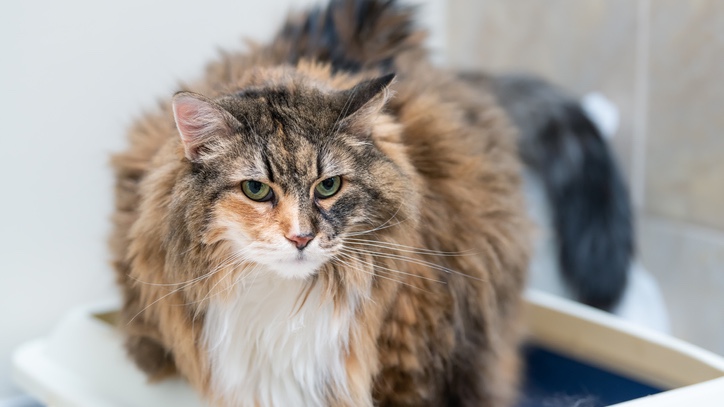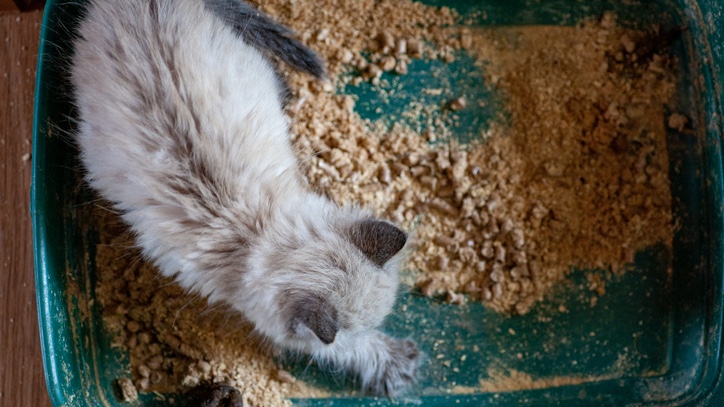Seven home remedies for cat constipation
These home remedies for cat constipation will help get your kitty’s bowels moving again

Get the best advice, tips and top tech for your beloved Pets
You are now subscribed
Your newsletter sign-up was successful
Looking for home remedies for cat constipation? While it’s incredibly common and usually mild, constipation can at the very least make your feline friend feel more than a little uncomfortable. If you suspect your cat may be constipated, having a good home remedy up your sleeve can come in handy.
Normal cat poop should be uniform in color, have a firm texture, and a clearly defined shape. You should be able to scoop it up easily and it shouldn’t leave any residue behind. In contrast, constipated stools (if they’re able to be passed at all) will usually resemble very hard, dry nuggets.
Most cats poop every 24 hours. If you notice that your cat is pooping less frequently or straining to eliminate their bowels, they may be constipated. While increasing their fluid intake by feeding them the best wet cat food or changing their diet altogether is a good starting point, there are also several other things you can try.
While you always want to speak with your vet if your cat has gone more than 48-72 hours without a bowel movement, there are some home remedies you can try before then to relieve your cat’s constipation and help them feel comfortable again. Let’s take a look…
Cat constipation symptoms
Being able to spot the signs of cat constipation depends on the type of moggy you have. If your cat goes outside to poop then you may not know that your feline has a problem for a while – you're going to see the issue much more clearly among indoor cats.
Indeed, if you check a cat's litter tray and it appears to be empty for more than 24 hours, it's time to be on the alert. At this stage, look out for signs of a tense abdomen, a hunched posture and a decreased appetite or maybe even vomiting. Cats can also become more lethargic when they are constipated and, if they are passing any stools, they are likely to be small, hard and dry.
Sometimes you end up seeing fecal fluid and it can look as if they are suffering from diarrhea. In all likelihood, this is going to be due to irritation of the colon lining, causing fluid to leak out of the cat's bottom. If you spot any signs such as these, then it's time to take some action. You may not necessarily have to visit a vet just yet – duration and severity are good indicators.
Get the best advice, tips and top tech for your beloved Pets
Causes of cat constipation
In humans, constipation is usually caused by diet: a lack of fluids, fiber or a sudden change are generally to blame. We can also get constipation if we sit or lie around for too long or exercise less than we should. Holding poop or becoming stressed or depressed are causes too.
Cats generally suffer constipation for much the same reasons. They may be reluctant to poop and hold it in for much longer than they should, for example. This could be due to a dirty litter box or its position: cats are clean creatures and they can also become stressed and anxious if other cats are around or if the environment is not quite to their liking, perhaps because it's too busy and noisy.
You should also be aware of what a cat is consuming. A lack of fluid or a diet with insufficient fiber are likely to cause a problem. There are, however, other serious causes of constipation such as arthritis, allergies, inflammatory bowel disease, a hernia or a tumor around the pelvic area, cancer, perianal disease or an obstruction of the colon.
Indeed, the condition tends to arise more in older cats although this could be generally down to a more sedentary lifestyle. Finally, watch out for over-grooming: the more a cat licks their fur, the more hair is likely to make its way into the digestive tract and cause problems.
How to help a cat poop when constipated

If you believe your cat is constipated then you're going to want to do something to help. The good news is that there are a number of home remedies which can work wonders but, if you're going to try to offer assistance rather than call the vet at this stage, keep an overview of your treatment plan to ensure that it's having a positive effect.
You can do this by keeping a diary and noting down any symptoms you spot each day. It's a good idea, if the issue relates to an outdoor cat, to try and keep them indoors and introduce them to a litter tray so that you can monitor the stools for consistency and number. Keep a good idea on any potential displays of pain or strange behavior and check that they are eating.
But what home remedies can you try? Much depends on what you think the problem is but here are some suggestions:
1. Change the litter box
It's always a good idea to keep a litter box clean, more so if you're worried that it could be causing cats to hold their poop. A quick fix here is to ensure your cat's litter box is placed in a pleasant place. That way you can be sure that your cat at least feels comfortable trying to poop but if a feline already has constipation then this remedy is unlikely to resolve the issue in and of itself.
2. Add more fiber to the diet
You need to find a way of increasing the size and weight of a cat's stool and fiber does both of these things. It also softens feces making it easier to pass – aim for insoluble fiber and the stool will become bulkier thanks to the addition of moisture. Be wary of adding more fiber if your cat is already getting a lot, though. In this case, it could make the problem worse and you need your cat to digest nutrients.
3. Change the protein
It's also worth thinking about altering the protein source of a cat's diet, switching from lamb to chicken maybe but be aware that a change such as this can take anywhere from two to three months to have an effect.
It's not going to prove effective if the problem is a pressing one that needs immediate action. This is something to consider once the current issue has been resolved. Be sure you read up on changing cat food and how to make the transition safely if you are considering this.
4. Reduce anxiety and stress
There could be an underlying environmental cause for constipation. Is your cat going outside and getting bullied by other cats, for instance? Or is your family life too hectic for your kitty at the moment? Maybe a dog has moved into the neighborhood or someone is having an extension built. Giving supplements such as Zylkene and Solliquin or a calming pheromone such as Feliway can work wonders.
5. Offer them water
Cats don't tend to like licking water out of a bowl so if you want to make sure your feline friend is getting enough moisture then you have to think a bit more creatively. Maybe invest in a one of the best pet water fountains for your fur friend – the sound and smell of the water is enticing.
You should also consider the best cat food for your feline friend with constipation: reducing the amount of dry cat food you give in favor of the best wet cat food can increase moisture intake.
6. Keep them busy
Active cats are less likely to become constipated because it helps the intestines to move normally. Since taking a cat for a walk is out of the question (for most felines anyway!), you need to exercise a cat and keep them both mentally and physically stimulated by playing with them. Take your pick of the best cat toys and consider the best automated cat toys if you're away a lot.
7. Ensure a healthy weight
An obese moggy is undesirable for a number of reasons and the risk of constipation is one of them. Inflammation in the intestines means feces tends to hang around for longer as if attempting to make its way through your cat's body. Cutting a cat's weight if they are deemed to have packed on the pounds will help in the medium-to-long term and help to head off future problems.
When to see the vet
According to vet Dr. Rebecca MacMillan, who has provided an in-depth guide to normal vs abnormal cat poop in our vet's guide, it's usually a good idea to get a cat checked out if you suspect constipation.
Certainly, if the remedies above are not working very quickly, then you need to be sure that there are no underlying conditions such as a tumor, growth, nerve disorder, hernia or trauma to the pelvis. Vets are always there to advise and they can also offer over-the-counter laxatives which adds extra moisture to the intestines to soften the stool. These should not be used without vet advice, however.
A lack of adequate fluid throughout the day is a common cause of cat constipation. Check out our guide to dehydration in cats for information on what to do if your cat isn’t drinking enough.

David Crookes has been a journalist for almost 30 years and he has written for a host of magazines, newspapers, websites and books including the World of Animals Annual, BBC Earth, Live Science, The Independent and Tom’s Guide.
Born in England, he lives with two cats but he’s also keenly interested in the differences between the huge number of dog breeds – in fact, you can read many of his breed guides that he’s written in collaboration with vets here on PetsRadar.
With a lifelong passion for technology, too, he’s always on the lookout for useful devices that will allow people to keep their pets happier and healthier, and provide them more time to spend together.
David has a degree from Durham University, as well as postgraduate diploma in journalism from the University of Central Lancashire.
